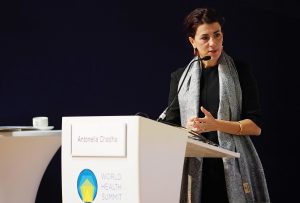Women’s Brain Project on COVID-19: Sex and Gender Differences Paving the Way for Precision Medicine

Antonella Chadha at the World Health Summit in Berlin
On February 10, an executive committee member of the Women’s Brain Project (WBP) travelled to China, taking medical aid and scientific knowledge to help in the first COVID-19 outbreak.
While she was not able to reach Wuhan, during her time in China she acted as a source of scientific information for the team of scientists working mostly pro bono at WBP.
When the first data became available from the affected Chinese populations, it appeared that more men than women were affected and dying from COVID-19.
This observation was of particular importance, because WBP studies the impact of sex (DNA-based) and gender (culture-based) factors on diseases, with a special focus on brain and mental health.
When infection spread to the home country of two WBP co-founders, Italy, data began to show that the sex and gender differences observed in the Chinese population also applied to Italy. By mid-May 2020, it was confirmed worldwide that women face the COVID19 infection with fewer complications and mortalities, despite comprising the majority of the front line healthcare workforce.
A similar situation occurred in the SARS and MERS epidemics, but the reason why fewer women are dying due to this type of viral infection is unknown. It is hypothesised that the main reason might be that the “abnormal” immune response which is stronger in men and leads to a pro-inflammatory cascade which attacks the body of the affected patient. Other speculation includes smoking habit (more frequent in men) and men’s reported tendency to poorer hygiene measures.
“When the first data became available from the affected Chinese populations, it appeared that more men than women were affected and dying from COVID-19.”
But the real truth is that we do not know yet. We have not learned from previous epidemics. Is this perhaps because in medicine such differences are not important?
Quite the opposite. Our work at the Women’s Brain Project shows that these differences play a major and crucial role.
First, sex and gender differences play a role in the trajectory and management of disease.
Second, myriad diseases differ between men and women in terms of prevalence and incidence, symptoms, the way the disease is diagnosed, the way it progresses over time, and the way it responds to treatment.
Although it is not always discussed, nearly every aspect of modern medicine confronts such differences. The good news is that although sex and gender differences are not yet part of the public discourse across the board, more scientific evidence has been gained that such differences have major implications in the way we understand and study diseases, develop medical treatments, and design technology for medical applications.
These differences also matter in terms of care for patients. This particularly true for brain and mental disease.
For Alzheimer’s Disease, migraine, depression, multiple sclerosis and certain brain tumours, the majority of patients are women. Parkinson’s, Amyotrophic lateral sclerosis (ALS), and midlife stroke are more predominant in men.
To analyse and characterise sex- and gender-based differences in such conditions is of extreme importance for the assessment of benefit and risk in treatment and intervention. This is particularly true for neurology and psychiatry, where one of the greatest unmet medical needs persists.
Coming back to Alzheimer’s Disease, we see that women are not only experiencing the disease more frequently, but they display a faster cognitive decline than men, with more brain atrophy. To bring successful drugs to the market, these aspects must be reflected in the study of drugs and the design of clinical trials.
If we wish to advance drug development in the field of brain and mental health, we must embrace approaches based on precision medicine — as we are doing for the drugs under development for Alzheimer’s. This means relying on pre-selected patients, based on testing positive to specific biomarkers of the disease, such as amyloid or tau. In this regard, some of the latest scientific evidence shows that women might have more tau protein deposits per same level of tau in certain brain regions.
The most important take-away of all this is that we have to move from the concept of one-size-fits-all in medicine to precision medicine.
Out of the COVID-19 tragedy, we have an opportunity to transform the healthcare system. By including factors such as sex and gender, genomic and proteomics, the microbiome, ethnicity, and the socio-economic status of patients in our analyses, we will be able to achieve precision medicine.
This will pave the way to embrace medicine that doesn’t treat a non-existent average persona, but according to their specific characteristics.
The result will be a more sustainable healthcare system, reduced costs, less waste, making drugs act better with fewer side effects, and achieving a better adherence to the treatment, because the drugs will work better.
The WBP mission is to carry out research and advocate for sex and gender differences as a key factor to achieving precision medicine.
This requires a systematic and meaningful analysis of sex differences in baseline patient’s characteristic, progression of the disease, and clinical outcomes — even when using digital of fluid biomarkers. We need to increase awareness of such differences and characteristics in the scientific community, the technology industry, among policymakers, and in the general public. We need to implement solutions such as explainable algorithms in data analysis (sometimes also referred to as explainable AI) and drug development to detect biases in systems and consequently implement mitigation strategies.
The strength of WBP lies also in taking precision medicine beyond the scientific community and healthcare specialists; in fact, we recently had the privilege to introduce Julius Baer managers and select clients to our work with few dedicated webinars.
Finally, we need to incorporate key ethical considerations during every stage of technological development, ensuring that the systems maximise the wellbeing and the health of the population. Only then, to quote Eric Topol, can we move from shallow medicine to precision medicine.
The good news is that World Economic Forum has an initiative on precision medicine that identifies key challenges, along with recommendations for its broad adoption. Certain specialties, such as oncology, are more advanced than neuroscience in implementing this approach, so we can learn from them. What this means is that there are pioneers within the healthcare system, and a shift is happening.
At WBP, we continue to catalyse multi-stakeholder dialogue and collaborations towards the goal of replacing shallow medicine with precision medicine for brain and mental health and are thrilled to have a growing group of supporters such as Biogen, Eli Lilly, Roche, and MCM. Precision medicine will be at the core of our International Women’s Brain and Mental Health Forum taking place virtually on 19-20 September this year, and an integral part of the Sex & Gender Precision Medicine Institute we are in the process of establishing. The Institute will work with corporates, academic institutions, policymakers, healthcare professionals, regulators, patients, and caregivers to proactively contribute to the evidence-base, novel technologies, and advocacy around precision medicine for brain and mental health. Anyone interested in improving health and care is welcome to be a part of it.
With brain and mental health at the forefront of many people’s minds after the COVID-19 lockdowns and the realisation that physical health is not the only key aspect of wellbeing to invest in, we believe that the time for this transformation is now. Our latest webinars about COVID-19, mothers and families, and children show that there is a thirst for shared knowledge and a collaborative design of the “new normal”.
That is why we invite people to join not only our project or initiative, but the WBP movement that is building like an inevitable wave of change. Don’t hesitate to get in touch.
Change is never easy, but it is often worthwhile.
About the Author
Dr Antonella Santuccione Chadha is the co-founder and CEO of the Women’s Brain Project. She was elected Top Woman in Business Switzerland in 2019, and will give the keynote at the World Sustainability Forum in September 2020 as one of the shortlisted candidates for their Sustainability Awards.
To find out more:
follow @womensbrainpro on Twitter
or visit www.womensbrainproject.com
You may have an interest in also reading…
The OECD Believes That the Eurozone Crisis is the Largest Single Threat to the Global Economy
The 17 nations that use the euro will see their economies shrink 0.1% this year, before showing weak growth of
From Croatia to Chile – The Luksic Family: From the World’s Driest Desert to the Forbes List
In Chile, everyone knows the Luksics and their remarkable story that started with Policarpo Luksic who left his native Croatia
All the World is But a Console, and Gaming Sector is Thriving
The at-home entertainment industry has thrived as enforced isolation and diminished human contact have drawn more people into gaming. Steam,
















































































